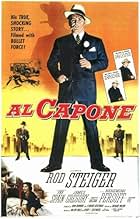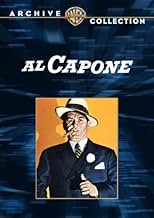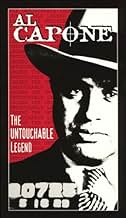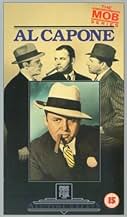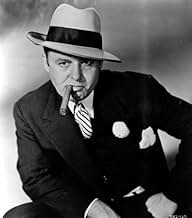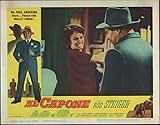IMDb-BEWERTUNG
6,7/10
2063
IHRE BEWERTUNG
Füge eine Handlung in deiner Sprache hinzuA chronicle of the rise and fall of Chicago crime boss Al Capone during the Prohibition era.A chronicle of the rise and fall of Chicago crime boss Al Capone during the Prohibition era.A chronicle of the rise and fall of Chicago crime boss Al Capone during the Prohibition era.
- Regie
- Drehbuch
- Hauptbesetzung
- Auszeichnungen
- 1 Gewinn & 1 Nominierung insgesamt
Raikin Ben-Ari
- Ben Hoffman
- (as Ben Ari)
Fred Aldrich
- Funeral Spectator
- (Nicht genannt)
Cindy Ames
- Nurse
- (Nicht genannt)
Empfohlene Bewertungen
This movie is the best presentation of "Al Capone" that I've ever seen. The movie is presented in a "Doccumentary" format which kept me "rivited" to the screen. This cast is an "All Star Cast" to say the least. Rod Steiger did an excellant job playing the character of "Al Capone" and as far as I'm concerned, has set the "standard" for other Actors to follow on how to play that particular character. I've seen the character of "Al Capone" played by Robert Di Nero, Jason Robards, Neville Brand, & Al Pacino, but NOBODY played him like Rod Steiger!!!
Also, when you have supporting cast members like Fay Spain, Martin Balsam & Neamiah Persoff, the production in my opinion can't help but be a hit. The way this Movie was put together gives it the ability to be relevant in just about any era. Even though it was filmed in 1959, it didn't show any signs of being "outdated" or "out of touch" in any way.
Once again, a great movie with some great acting in it. I would highly reccomend this movie to anyone.
Also, when you have supporting cast members like Fay Spain, Martin Balsam & Neamiah Persoff, the production in my opinion can't help but be a hit. The way this Movie was put together gives it the ability to be relevant in just about any era. Even though it was filmed in 1959, it didn't show any signs of being "outdated" or "out of touch" in any way.
Once again, a great movie with some great acting in it. I would highly reccomend this movie to anyone.
Although Rod Steiger gives an electrifying performance as Al Capone in the film of the same name, it could have been done a whole lot better.
Influenced by the success of The Untouchables on television the classical gangster film underwent a short revival for about five years in the late Fifties and early Sixties. It was inevitable that a film about the most notorious gangster name of all would get a biographical film.
The film concentrated on Capone's public life and the stories of gangland lore that have circulated about him. Very little is shown of his personal life, he had a wife and child and many a mistress not just the character Fay Spain portrays. Rod Steiger has been accused of overacting in his characterization, but in fairness I don't think the writers and director gave him much to work with.
With one exception no characters had name changes. The one being Martin Balsam's character who was based on reporter Jake Lingle whose connections with the underworld got him many a good story, but also compromised his integrity. Capone is shown being responsible for Balsam's death, but in real life there are many theories about Lingle's demise.
One character is grafted in from New York. There was no such a character as James Gregory's honest inspector, mainly because there were damn few honest cops in Chicago in the Twenties. His character is based on Lewis J. Valentine who did run a confidential squad in New York City and faced a lot of political pressure from Tammany Hall. Under Fiorello LaGuardia, Valentine became the city's police commissioner, probably the best one we ever had.
Still if you were a big fan of The Untouchables, you should definitely like this Al Capone movie.
Influenced by the success of The Untouchables on television the classical gangster film underwent a short revival for about five years in the late Fifties and early Sixties. It was inevitable that a film about the most notorious gangster name of all would get a biographical film.
The film concentrated on Capone's public life and the stories of gangland lore that have circulated about him. Very little is shown of his personal life, he had a wife and child and many a mistress not just the character Fay Spain portrays. Rod Steiger has been accused of overacting in his characterization, but in fairness I don't think the writers and director gave him much to work with.
With one exception no characters had name changes. The one being Martin Balsam's character who was based on reporter Jake Lingle whose connections with the underworld got him many a good story, but also compromised his integrity. Capone is shown being responsible for Balsam's death, but in real life there are many theories about Lingle's demise.
One character is grafted in from New York. There was no such a character as James Gregory's honest inspector, mainly because there were damn few honest cops in Chicago in the Twenties. His character is based on Lewis J. Valentine who did run a confidential squad in New York City and faced a lot of political pressure from Tammany Hall. Under Fiorello LaGuardia, Valentine became the city's police commissioner, probably the best one we ever had.
Still if you were a big fan of The Untouchables, you should definitely like this Al Capone movie.
It's 1919 Chicago. Al Capone (Rod Steiger) is new in town. Nationwide Prohibition begins in 1920. The violent thug rises to be a top gangster.
This is a brutal depiction of the crime figure. It does have his prominent face scar. I don't always remember it being that prominent although the man is nicknamed Scarface. Overall, the performance has a realistic brutality. It's a rather straight forward biopic. I'm not sure how much new is being done here. Rod Steiger seems to have a dash of Brando but he's not at that level of charisma. The power is present. Others have done it bigger. Nevertheless, it's a very worthy performance.
This is a brutal depiction of the crime figure. It does have his prominent face scar. I don't always remember it being that prominent although the man is nicknamed Scarface. Overall, the performance has a realistic brutality. It's a rather straight forward biopic. I'm not sure how much new is being done here. Rod Steiger seems to have a dash of Brando but he's not at that level of charisma. The power is present. Others have done it bigger. Nevertheless, it's a very worthy performance.
Many actors have portrayed Capone over the years. It's virtually a "cottage industry," guaranteeing that yet another Capone flick will hit the screens before the collective audience has quite recovered from its yawn at the last one. And yet, for me, no one has ever come quite so close to nailing the role as Rod Steiger in this 1959 black-and-white low-budget effort.
As a matter of fact, using the term "low-budget" does this film a disservice, calling to mind as it does the run-of-the-mill output of producer/distributor Allied Artists (usually on the scale of "Attack Of The 50-Foot Mummified Woman Meets Godzilla's Teenage Werewolf Son"). For this film, however, the studio assembled a strong acting ensemble which includes Martin Balsam, Nehemiah Persoff, Murvyn Vye, and James Gregory, all of whom deliver standout performances.
Yet it's Steiger whose performance holds this film together. His Capone is a monster whose mood swings defy the term "mercurial," yet his psychopathy seems somehow strangely -- disturbingly -- human. You can sense the demons deep within him, and how they drive him, but you're never allowed to glimpse them, not even momentarily, lest you lose sight of the fact that this man truly is a monster. Eerily compelling, even hypnotic (particularly as he woos -- and wins! -- the widow of a cop he's previously murdered), Steiger invests his characterization with the bravura of the opera which the real-life Capone professed to admire. Alternately wheedling and bullying, bellicose and scheming, he assumes a larger-than-life mythos which resonates all the more uncomfortably due to a sense of plausibility, the feeling that such men do continue to exist among us.
The storyline itself is more or less factual, save for Gregory's character (which isn't even really a composite of any particular real-life law enforcement personnel), as well as a decision to re-name Balsam's character rather than use the identity of the real-life Jake Lingle, upon whom the character is based. Certain incidents have been fictionalized as to the way they happened, but that's to be expected in the interest of dramatic effect.
Overall, the film achieves an almost documentary effect. Steiger's performance makes it a very chilling documentary, indeed.
As a matter of fact, using the term "low-budget" does this film a disservice, calling to mind as it does the run-of-the-mill output of producer/distributor Allied Artists (usually on the scale of "Attack Of The 50-Foot Mummified Woman Meets Godzilla's Teenage Werewolf Son"). For this film, however, the studio assembled a strong acting ensemble which includes Martin Balsam, Nehemiah Persoff, Murvyn Vye, and James Gregory, all of whom deliver standout performances.
Yet it's Steiger whose performance holds this film together. His Capone is a monster whose mood swings defy the term "mercurial," yet his psychopathy seems somehow strangely -- disturbingly -- human. You can sense the demons deep within him, and how they drive him, but you're never allowed to glimpse them, not even momentarily, lest you lose sight of the fact that this man truly is a monster. Eerily compelling, even hypnotic (particularly as he woos -- and wins! -- the widow of a cop he's previously murdered), Steiger invests his characterization with the bravura of the opera which the real-life Capone professed to admire. Alternately wheedling and bullying, bellicose and scheming, he assumes a larger-than-life mythos which resonates all the more uncomfortably due to a sense of plausibility, the feeling that such men do continue to exist among us.
The storyline itself is more or less factual, save for Gregory's character (which isn't even really a composite of any particular real-life law enforcement personnel), as well as a decision to re-name Balsam's character rather than use the identity of the real-life Jake Lingle, upon whom the character is based. Certain incidents have been fictionalized as to the way they happened, but that's to be expected in the interest of dramatic effect.
Overall, the film achieves an almost documentary effect. Steiger's performance makes it a very chilling documentary, indeed.
Like so many mid-century biographical films, Al Capone marches through the man's life, giving equal weight to each way-point. It also fails miserably by providing no psychological or historical context for how he became one of crime's most notorious characters. In fact, the film succeeds in white-washing this killer. He woos the widow of one of his victims. He repeatedly makes the point that he's never been convicted of any crime. People die, but there is no depiction of Capone's ruthless, brutal side. Rod Steiger in the title role does an admirable job with the shallow script, but this is not enough to make the film worth watching. Oddly, there's no mention of Elliot Ness and when it comes to summing up Capone's end, we're told he died of "an incurable disease." What, audiences in 1959 couldn't handle the word "syphilis"?
Wusstest du schon
- WissenswertesMartin Balsam's character, Mac Keeley, was based on a real-life Chicago Tribune reporter named Jake Lingle. Lingle, a "legman" who ran down gang-related stories for the paper, had close ties to Al Capone and other gangsters as well as the notoriously corrupt Chicago Police Department, and he was well-paid by both mobsters and a police commissioner as a "go-between." Lingle was gunned down on June 9, 1930, much as depicted in the movie, after "getting too big for his hat", as Capone put it, and demanding too much for his services (though a Capone rival likely paid for the hit). Apparently legal concerns prevented the producers of this film from using Lingle's name. However, just a few months after this film was released, the TV series Die Unbestechlichen (1959) told Lingle's story in its third episode and used his actual name.
- PatzerAl Capones had two scars on his left cheek according to actual (if rare - Capone disliked being photographed to show them as is correctly pointed out in the film) photos. The depiction in films like Chicago-Massaker (1967) and Capone (1975) is closer to the truth.
- Zitate
Al Capone: Nobody leaves Al Capone, you understand that?
Maureen Flannery: Well I do!
Al Capone: Oh no, you don't!
Maureen Flannery: Would you do me a favor please? Would you kill me?
- VerbindungenEdited into The Mystery of Al Capone's Vaults (1986)
Top-Auswahl
Melde dich zum Bewerten an und greife auf die Watchlist für personalisierte Empfehlungen zu.
- How long is Al Capone?Powered by Alexa
Details
- Erscheinungsdatum
- Herkunftsland
- Sprache
- Auch bekannt als
- Al Capone - Der größte Gangster aller Zeiten
- Drehorte
- Produktionsfirma
- Weitere beteiligte Unternehmen bei IMDbPro anzeigen
Box Office
- Budget
- 550.000 $ (geschätzt)
- Laufzeit1 Stunde 44 Minuten
- Farbe
- Seitenverhältnis
- 1.85 : 1
Zu dieser Seite beitragen
Bearbeitung vorschlagen oder fehlenden Inhalt hinzufügen



